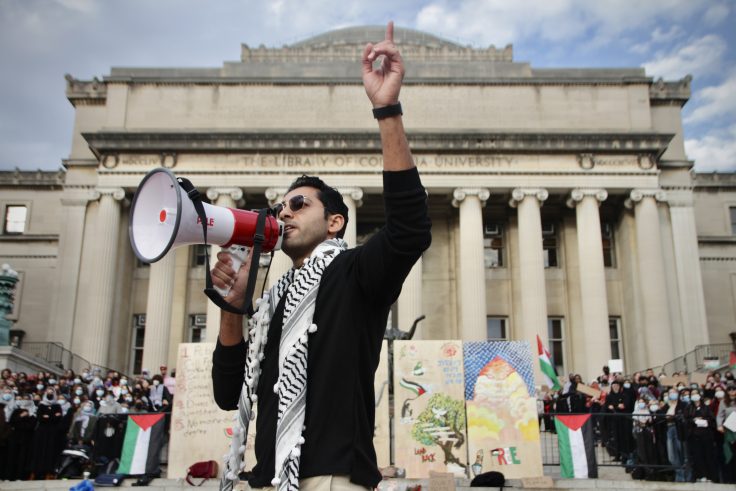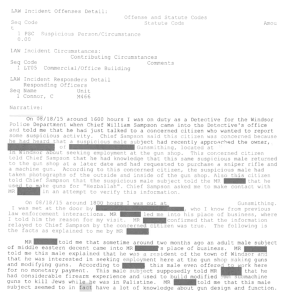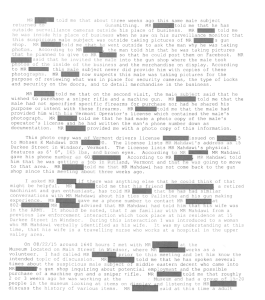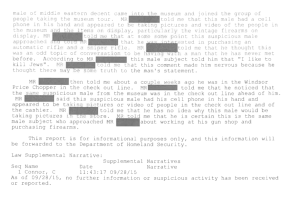According to a 2015 police report and locals who spoke with the Free Beacon, the Columbia University activist said he ‘like[d] to kill Jews’

A Palestinian activist at Columbia University spooked neighbors in his small Vermont town by bragging about his hatred of Jews and his background of building weapons for terrorist groups, according to interviews and 2015 police records obtained by the Washington Free Beacon.
Mohsen Mahdawi, who had recently moved to Windsor, Vt., from the West Bank, told multiple people in town that he had previously worked in a Palestinian refugee camp building guns for terrorists.
“He said his job in the refugee camp was to make weapons,” a source familiar with Mahdawi said. “He bragged about friends and family wanting to kill Israelis.”
Mahdawi, a leader in Columbia’s pro-Hamas movement, whom ICE detained and later released, is suing the Trump administration for revoking his green card. He described himself as a “peacemaker” in a sympathetic interview with CBS News and as a “human rights advocate” in the bio under his New York Times op-ed. He even earned a visit from Senator Peter Welch (D., Vt.), who called him a “friend” who worked with “Jewish brothers and sisters at Columbia.”
But police records and interviews about his time living in Windsor, Vt., paint a drastically different picture.
“He was a very angry young man at the time,” a local who knew Mahdawi in 2015 told the Free Beacon.
The Trump administration has argued that Mahdawi’s presence in the country, where he has organized anti-Israel demonstrations, undermines American national security. In court filings, the administration cited the 2015 Windsor police report, noting that Mahdawi had expressed to neighbors that he “like[d] to kill Jews.”



Mahdawi’s lawyers have dismissed the report as “hearsay,” adding that a subsequent FBI investigation into their client never led to charges. One of his attorneys declined to confirm whether his client built weapons during his time in the refugee camp. Instead, the lawyer referred the Free Beacon to a recent statement from the judge in the federal lawsuit, which said police reports about Mahdawi from 2015 were not enough to “support a finding of dangerousness.”
Despite those claims, both local and federal law enforcement took the case seriously at the time. After interviewing multiple witnesses, police referred the matter to the Department of Homeland Security. The FBI then launched an investigation, which included an undercover operation, into whether Mahdawi was an active terrorist threat, a source familiar with the probe told the Free Beacon. The investigation did not lead to charges, but the Trump administration denies that it was ever officially closed.
The 2015 police report includes direct interviews with several of Mahdawi’s neighbors in Windsor, Vt., who feared Mahdawi was planning a gun heist.
According to the report, a local firearms store owner told police that Mahdawi visited his business and said he “was interested in seeking employment here at the gun make shop, making guns and modifying guns” and “even offered to work here for no monetary payment.”
Mahdawi told the gunsmith that he had “considerable firearm experience and used to build modified 9mm submachine guns to kill Jews while he was in Palestine.” He also appeared to “have a lot of knowledge about gun design and function.”
The gunsmith said he spotted Mahdawi on the store’s external surveillance cameras “outside taking pictures” of the shop several weeks later. When the owner confronted him to ask what he was doing, Mahdawi said he planned to give the store owner the photos “so that he could post them on Facebook.” However, Mahdawi “never did provide [the owner] with copies of these photographs.”
Mahdawi also took photos of the gun inventory inside the store. He said he wanted to purchase a “sniper rifle and a machine gun,” and provided the owner with a copy of his Vermont operator’s license. The owner later turned the documents over to the police.
Police also interviewed a guide at a neighboring vintage firearms museum who gave a similar account of Mahdawi visiting and taking extensive photographs of the gun displays. The museum employee told police that Mahdawi said he was “interested in purchasing an automatic rifle and a sniper rifle,” which the guide said he “thought this was an odd topic of conversation to be having with a man that he has never met before.”
It was during that conversation when Mahdawi allegedly told the guide, “I like to kill Jews.” The museum employee told police the comment “made him nervous because he thought there may be some truth to the man’s statement.”
The contents of the police report align with some of Mahdawi’s social media comments that the Free Beacon previously reported. The Columbia activist has praised his cousin, a slain terrorist leader in the Al-Aqsa Martyrs’ Brigade, as a “fierce resistance fighter,” and defended Hamas’s October 7 attacks, saying Israel had provoked the massacres.
The cousin, Maysara Masharqa, “took part in shooting attacks against Israeli communities” according to the Israel Defense Forces and was killed alongside a Hamas commander in the West Bank in August 2024. Masharqa in 2012 admitted to making bombs and throwing explosives at IDF soldiers “on a large number of occasions and from a short distance.”
Mahdawi’s uncle, Yousef Mahdawi, planned a 2003 suicide bombing in the Israeli city of Netanya, injuring over 60 people. He received over $300,000 from the Palestinian Authority while serving a prison sentence. When Yousef Mahdawi’s name appeared on the list of prisoners set to be released in exchange for four Israeli hostages, Mohsen Mahdawi wrote in an Instagram post that “justice is inevitable.”

















